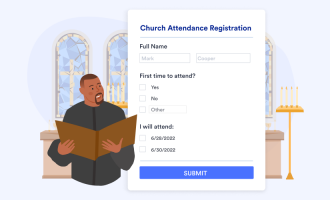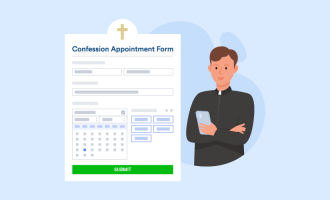Being a pastor requires helping people in their most personal lives. While responsibilities vary by denomination, a pastor can baptize babies, wed couples, and speak at funerals. A pastor is the head of a religious community, which is a lot of responsibility.
Accordingly, the procedure for becoming a pastor and increasing church attendance is challenging. It takes academic rigor and humanitarian warmth to become a pastor, and then some ingenuity to grow your existing audience.
Here are the simple steps to become a pastor and increase church attendance
- Preparation
- Applying as a pastor
- Improving content quality
- Being active on social media
Becoming a pastor
Preparation
Pastorhood requires both biblical expertise and charitable warmth in your community. While different, neither can be neglected as you learn how to become a pastor.
Biblical expertise is a matter of practice. You should be able to support every claim you make with specific scriptures verbatim. It takes years of consistently and repetitively reading the Bible to develop this skill.
This is why many churches prefer pastors to have degrees, such as a Master of Divinity. But there are many other opportunities to show your scriptural knowledge. Ultimately, knowing the scripture will inspire your sermons, your advice, and everything else. It’s a kind of meta-skill that makes every other responsibility easier.
Paired with this is being charitable with your community. Even before expressing interest in learning how to become a pastor, you should be involved. Volunteer for charity, community outreach, socials, and any other events your church is involved with. Practically, this will help you network with everyone you’ll need to know in the application process. Spiritually, it will train you in the service-oriented mindset necessary for the church.
Applying as a pastor
Given these two skills, you’ll be prepared for the formal procedures of becoming a pastor. You need to do some basic research to see where you qualify. Some churches have more specific pastoral qualifications than others — like whether you’re single, if you’ve been divorced, or whether you’re gay or not. You’ll need to see if your history aligns with these requirements.
Next is an initial outreach phase. Ideally, this involves expressing your interest to the pastor you’ve become close with during community events, who will then convene with peers to see if you’re a good fit. Alternatively, you can use LinkedIn, Indeed, or other job websites. What’s important is getting your foot in the door.
The second-to-last step is the inquiry phase. This involves an extended conversation with the church’s pastors. Typically, they’ll ask you about your background, your perspectives, why you want to become a pastor, and any number of things to see if you’re a good fit for their church and denomination. It’s essentially an interview. The more biblical expertise and longer a track record of community engagement you have, the better.
If accepted, you’ll enter a training phase. This varies by denomination but can involve associate pastoral positions, internships, or potentially financing for more studying. Typically, this phase takes two to three years of work so that you can properly represent the faith by the end of it.
Increasing church attendance
Now that you know how to become a pastor, you’re responsible for figuring out how to increase church attendance.
Here, it’s useful to think like a content marketer. Companies use content marketing to organically raise brand awareness and, in the long run, profit.
One content marketing tactic you can use is publishing awesome blogs that inform and entertain your audience. Another is to consistently publish brief, shareable social media updates.
By combining these tactics, companies have bypassed advertising and entered into a marketing paradigm where everyone wins.
Content quality
As a pastor, content quality means making church an amazing experience. It requires delivering awesome sermons, developing a sociable and engaging community, and many of the tactics discussed earlier. The more your audience is thrilled, the more likely they’ll bring their friends and family and recommend you to every Christian they meet.
Social media
Simultaneously, however, there are some commonsense tools churches can benefit from. Platforms like YouTube have become incredibly popular for Christians. Jefferson Bethke, for example, regularly draws millions of views for his videos. Typically he deals with practical applications of the Bible to real life. This sensibility has made him incredibly popular with a young audience.
Along with YouTube, there are multiple other social media possibilities. Post pictures of your charity events on Instagram. Tweet your favorite Bible verses. Blog about current events. Far from being a fad, social media has become a valid new form of expression in its own right, and its applications are still being explored.
Use nuance in your growth strategy. Word of mouth and social media aren’t mutually exclusive. The best marketers use both to create results.
When becoming a pastor, use biblical expertise and community synchronously. In increasing church attendance, thrill your church while telling others about it on social media. The faith isn’t either-or with technology, it’s multiplicative — yes-and.



















Send Comment:
1 Comments:
More than a year ago
Hello, hi, My name is Livinus Archard Mwebesa, am from Tanzania East Africa, am a church elder and a pastor to be, please I need your prayers andAm so happy to have you here in this blog, thank you all and be blessed.